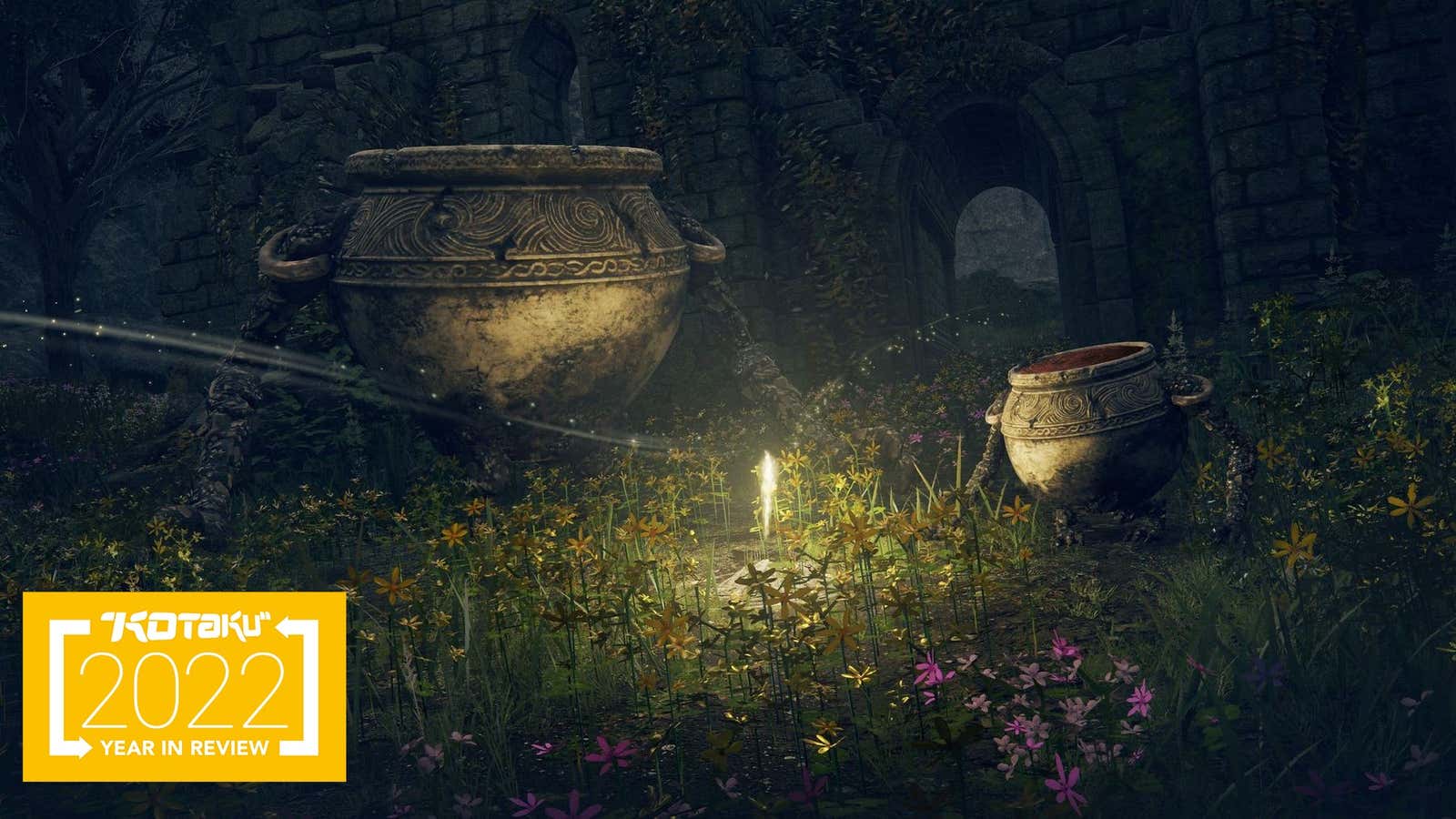2022 was the year of Elden Ring, of Miyazaki, of Malenia. The highly anticipated FromSoftware title held the industry by its throat for months, dominating the conversation around difficulty, damage scaling, and player builds (including everyone’s favorite nepo baby, Elon Musk). It took over streaming, it renamed every animal ‘dog,’ it created legends.
After over a decade of FromSoftware games holding court as the quintessential ‘git gud’ franchise, locking those of us without a masochist bent out of the discourse, Elden Ring’s open world opened up the gates for an entirely new player base. As such, it catapulted the work of Hidetaka Miyezaki to entirely new heights: Elden Ring is by far the best-selling FromSoftware title, it’s snatching up GOTY awards like Rowa Fruit, and it’s still generating passionate conversations 10 months after its release.
By subtly divesting from the tried and true FromSoftware formula and giving us a game unshackled by a single, punishing, linear path, Elden Ring offered up the Lands Between on a beautifully ornate (but slightly Tarnished) silver platter. And we gobbled that shit up.
Feeding The Difficulty Discourse Machine
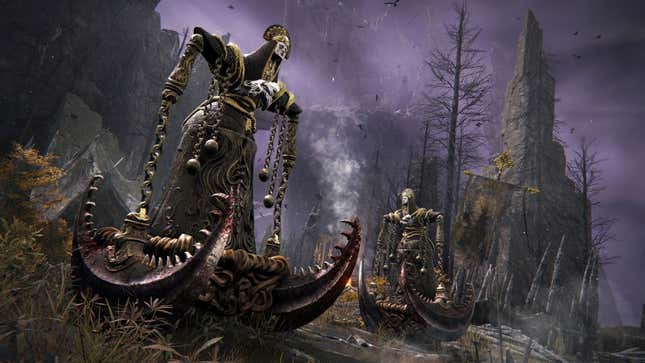
The Souls game discourse has almost solely revolved around difficulty. Before Elden Ring was released, FromSoftware’s Yasuhiro Kitao told Eurogamer that the game was “made for all sorts of players,” not just “hardened veterans.” This sent the fanboys into a tailspin, but it piqued the interest of those who have never been able to enjoy the punishing gameplay of FromSoft’s oeuvre.
I wrote about Kitao’s quotes back when I was at GamesRadar, suggesting that what would make Elden Ring great would be its approachability, and that that approachability was made possible by its open world. It’s a helluva lot easier to avoid difficult areas if you can run around them on horseback, but previous Souls games forced you to choose between the difficult path and the bang-your-head-against-the-wall-because-it’s-impossible path. The promise of ample choice made me think that maybe, just maybe, Elden Ring could be a game I’d enjoy.
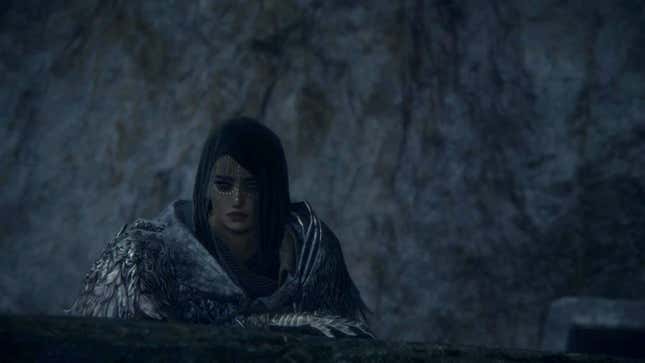
Conversely, Forbes published a response to my piece, one that hoped Elden Ring’s open world wouldn’t ruin the FromSoftware vibes by focusing too much on “making these games approachable rather than tough and gritty.” This was months before the release date, but the discourse machine turned and turned and turned, smoke spewing from every inch, its cogs grinding and grating with each new take chucked into its gaping maw.
Until February came, and brought with it the Lands Between, wide open for exploration like a darker, deadlier Breath of the Wild. Players quickly learned that most of them were accidentally skipping the combat tutorial, and a bit more slowly learned that the first boss (that fucking Tree Sentinel) was avoidable. Many of us who could never latch onto a FromSoft game willingly clung to Elden Ring’s teat, as we learned we could, in fact, get on a horse and fuck off away from some horrifying eldritch beast.
As we collectively made our way through Elden Ring, we were given the gift that comes only with truly open-world games: seemingly endless discoveries by ourselves, our friends, and other players on the internet.
Braving Brutal Battles For A Glimpse Of Beauty
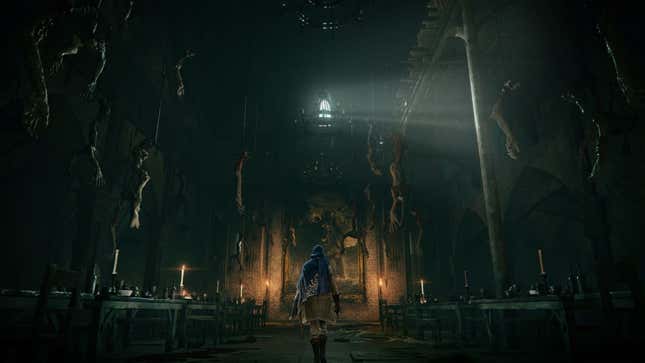
The beauty of Elden Ring lies in its world that teems, bubbles, and spews with both friendly and deadly life, that tantalizes and terrifies with its landscapes, that beckons and shuns you in a single breath. I find this beauty in so many moments during my time with the game, like when I accidentally descend down to the Siofra River, not too long into my playthrough.
In Limgrave, I step on a platform and am whisked down, down, down, until I emerge into an astounding space: a fully realized night sky in a variety of bruise colors, littered with pinholes of light. Crumbling classical architecture obfuscates my view of this impossible galaxy and tombstones line the path leading away from the platform, which glowed a bizarre green during my descent but now lies dormant.
I am, as the kids say, gagged, and stumble aimlessly away from the platform, paying little attention to what enemies may lie in my path for the first time since booting up Elden Ring. This is a mistake I quickly pay for, as I walk directly into a horde of Claymen. They move slowly, but they hurt, and I am severely underleveled for this area. One of the weaponless magic conjurers takes me out in seconds with his weird bubbles, sending me back to the Site of Grace right next to the platform that brought me here. When I go back to fetch my several hundred runes, the same guy takes me out again.
“Fuck that,” I mumble before stepping on the stone circle at the center of the lift. “I’ll come back later.”
And I do, just much, much later. After I’ve discovered I’m a battle mage with an affinity for gravity magic and summons, and long after I fell the Tree Sentinel with a single Rock Sling, I return to the Siofra River from a completely different direction, and lay waste to its inhabitants. Then, after I’ve collected every last item dropped by a fallen NPC and picked all the Ghost Glovewort my eyes can see, I allow myself a second to breathe. I glance up at that still-impossible night sky, and exhale. I earned this. Elden Ring, unlike other FromSoftware games, gave me ample chances to amass the tools and experience I’d need to earn a brief respite.
Elden Ring Eternal
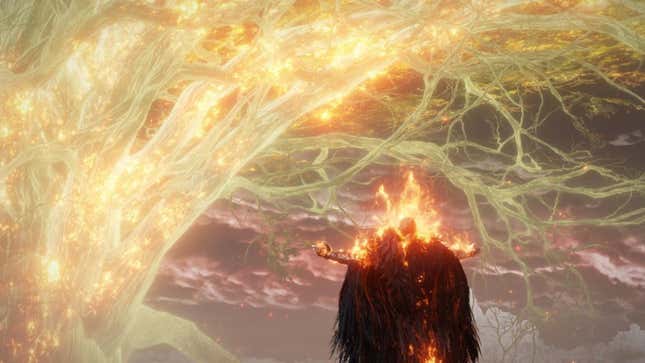
But Elden Ring isn’t just somber and serious, it’s not just hours of grueling gameplay with brief, meditative breaks. It’s goofy as hell, like all FromSoftware games inherently are. There are stupid, dirty messages littered all over the ground, dozens upon dozens of ways to die that will make you chuckle in disbelief, and the ever-popular but always somewhat broken online play that encourages players to fuck with one another.
It’s this combination of punishing play, engaging story (thanks, George R.R. Martin), and asinine antics that make FromSoftware games, especially this one, so special. Elden Ring gives you enemies like Starscourge Radahn, who will in one moment beat the brakes off of you with gigantic meteors flung from a blood-red sky and in another send you into a fit of hysterics when you realize that he is, in fact, sitting on top of a very tiny horse. Elden Ring plays with you, offering up prophecies and moral quandaries that will have you scratching your head, but undercutting it with both accidental and purposeful absurdism.
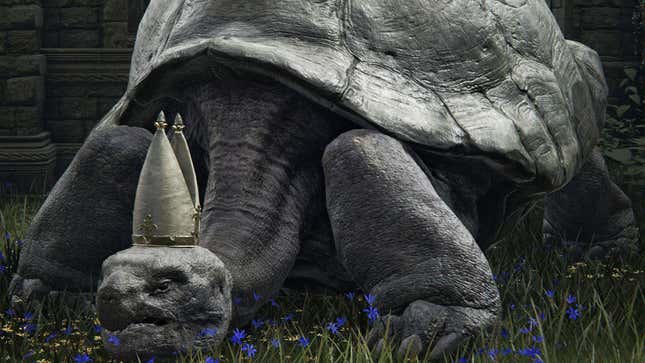
Elden Ring gives you a gigantic turtle wearing a pope hat. It gives you strange, unsettling storylines about grapes that are actually eyeballs. It tucks a giant bat grandma away amongst a rocky outcropping and gives her a haunting song to sing ad infinitum—or until you slash at her leathery, gray skin. It deflates your hope in humankind at one juncture just to build it back up again at the next.
It lets you explore this incredibly fucked-up world for hours upon hours, fall in love with some of its characters and revile the rest, taxing you physically and mentally with enemies plucked from the deepest depths of game design hell, and at the end, it presents you with a few options that don’t really fucking matter. It does all of this while making itself playable for us FromSoft plebeians, which therefore (brilliantly) means more of us will be talking about it than any game that came before.
When we inevitably look back at Elden Ring a decade from now, it will be difficult for us to remember exactly how much it defined the zeitgeist, just how far it permeated popular culture outside of gaming, and just how much we couldn’t stop talking about it. But now, ten months after its release, it’s hard to imagine we ever existed in a world without it.





